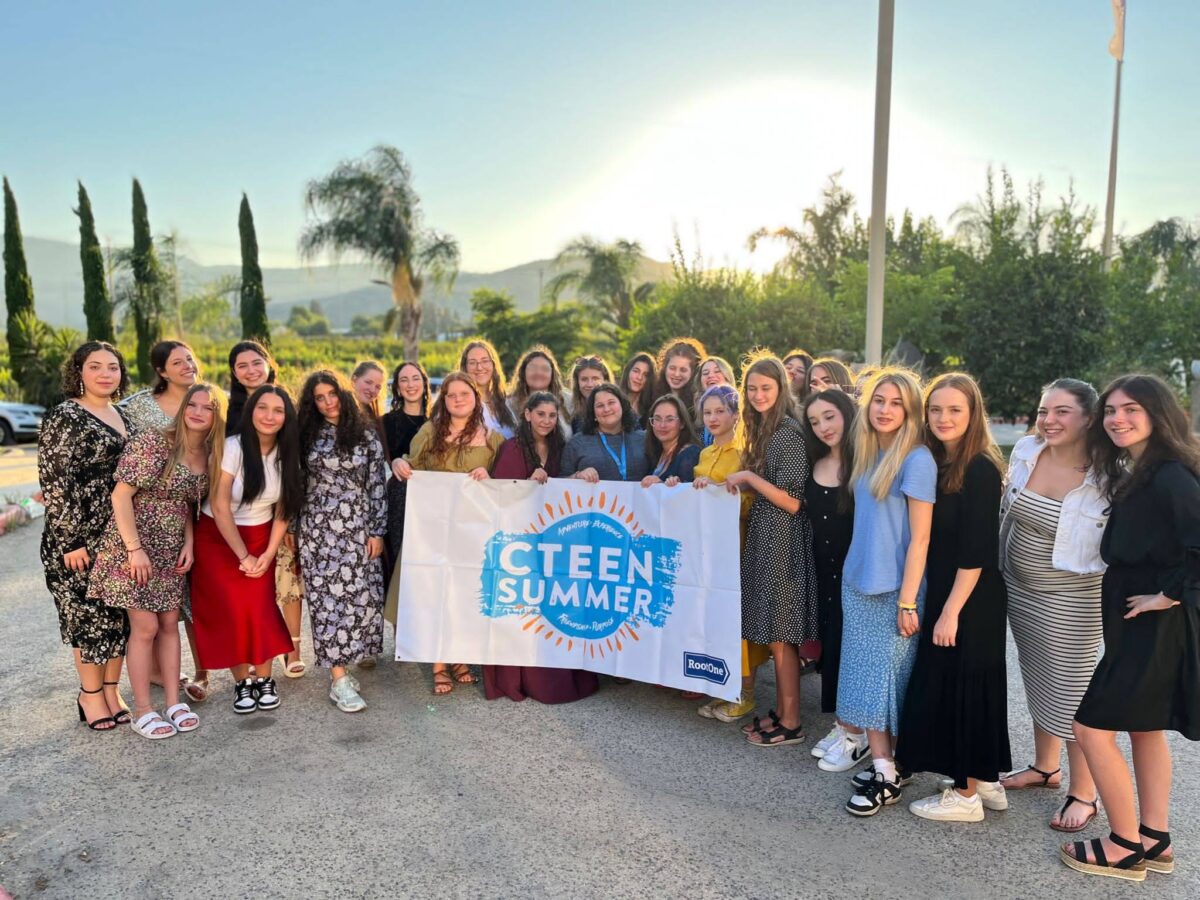Your Daily Phil: How to make Israeli cities more innovative + Reflections on Tisha B’Av
Good Wednesday morning!
Ed. note: We will not be publishing tomorrow in observance of the fast of Tisha B’Av, which begins this evening. The next Your Daily Phil will arrive on Friday.
In today’s edition of Your Daily Phil, we interview James Anderson, the head of government innovation programs at Bloomberg Philanthropies, and feature opinion pieces from Rabbi Dr. Benji Levy and Andrés Spokoiny about the lessons of Tisha B’Av. Also in this newsletter: Miriam Terlinchamp, Bret Stephens and Miriam Adelson. We’ll start with a Knesset hearing about antisemitism on U.S. college campuses.
American Jewish leaders and Israelis studying in the United States appeared in the Knesset on Tuesday to discuss antisemitism and anti-Zionism on American campuses in light of recent incidents and the release of the White House’s national strategy to combat antisemitism, reports eJewishPhilanthropy’s Judah Ari Gross.
The discussion was hosted by the Knesset’s Immigration, Absorption and Diaspora Affairs Committee, which is chaired by MK Oded Forer of the Yisrael Beiteinu party. In his opening remarks, Forer noted a recent increase in violent antisemitic incidents worldwide in the first quarter of 2023, as well as a recent survey by the Anti-Defamation League, which found that 20% of Americans and 25% of Europeans hold antisemitic views. Forer said these figures “made us very concerned.”
William Daroff, CEO of the Conference of Presidents of Major American Jewish Organizations, addressed the committee, reiterating American Jews’ support for and closeness to Israel and describing the White House’s antisemitism strategy and how it can be used to address the issue of antisemitism on campus.
“The Biden plan emphatically states, ‘When Jews are targeted because of their beliefs or their identity, when Israel is singled out because of anti-Jewish hatred, that is anti-Semitism and that is unacceptable.’ The plan also embraces the [International Holocaust Remembrance Alliance’s] definition of antisemitism, which clearly links forms of anti-Zionist rhetoric with antisemitism,” Daroff said.
“These are powerful words that are backed up by the strength of the United States government, and we hope they have the impact necessary to make Jewish students feel secure in their complete identity in colleges and on campuses,” he said.
Kenneth Marcus, the founder and chairman of the Louis D. Brandeis Center for Human Rights Under Law, reiterated his concern that while the White House strategy “embraces” the IHRA definition, it also “acknowledges the NEXUS definition, which is a less protective definition,” which he said was a ”challenge for us.”
Mark Rotenberg, Hillel International’s vice president of university initiatives and legal affairs, noted that the past few years have seen a “dramatic decline in BDS campaigns” on university campuses, “from a high of 37 such campaigns in 2019 to only five in 2022.”
Rotenberg credited the decline to the fact that “Jewish organizations and Jewish students and the Jewish community have successfully beaten that back. Not a single university in America has actually endorsed BDS as an administration. Not one, not a small liberal arts school, not a big public research university.”
Read the full story here.
city hall overhaul

Dozens of mayors and municipal employees from cities across Israel gathered in Jaffa on Tuesday to share challenges, swap tips and brainstorm solutions to shared problems as part of an initiative backed by Bloomberg Philanthropies. The conference, known as Hazira, or “the scene,” was held at the Peres Center for Peace, a partner in the project, with support from Israel’s Interior Ministry, which is responsible for municipal affairs, reports eJewishPhilanthropy’s Judah Ari Gross.
James Anderson, the head of government innovation programs at Bloomberg Philanthropies, sat down with eJP to discuss the Hazira program and how Bloomberg Philanthropies sees the role of philanthropy in the development of cities.
Judah Ari Gross: How did you get involved with Bloomberg Philanthropies and this initiative specifically?
James Anderson: After spending eight years in the Bloomberg administration — four years at the [New York City] Department of Homeless Services and then four years as Mike’s communications director at City Hall — I joined the foundation in 2010. It was very early days, and I started the government innovation program. At the time, coming out of City Hall, I think Mike [Bloomberg] recognized that — number one — the unique opportunity and power of local leaders not only to address global problems but to restore trust and to improve the lives of everyday people. Number two — that the job is really hard and mayors often don’t have the support and resources and connections they need to be as successful as we need them to be. And number three — that philanthropy could play a catalytic role in showing what’s possible and building demand and supporting the work in different kinds of ways. And that’s really what our programs are focused on.
Read the full interview here.
A time to weep
Permission to grieve: The mourning of Tisha B’Av

“It can be awkward. Intimidating. And incredibly difficult to attend a shiva house. Whether the mourner is a friend or family, member of the community or student, when I walk through the door, the air is noticeably heavier. Our eyes connect and Jewish law guides me not to greet normally as I sit and join in their sadness. As someone who appreciates the natural cadence of human interactions, the clumsy silence that often pervades the visit adds an uneasiness to the pain. I want to offer comfort, but I know that I am not here to fix; I’m here to sit, to share, to be. As the time to depart arrives, I echo the same words as others, connecting them to the broader mourners of Zion and Jerusalem,” writes Rabbi Dr. Benji Levy, co-founder of the philanthropic advisory Israel Impact Partners, in an opinion piece for eJewishPhilanthropy.
Just mourning: “I have often struggled with [Tisha B’Av]. My natural tendency is to quickly jump in and offer solutions rather than sympathy, to try and fix whatever may seem damaged or broken. And yet, while there is a time and place for that tendency, it is not on this anomalous day. A distinct purpose of Tisha B’Av is not to raise us beyond sadness, but let it linger. Unlike Talmudic fasts that were centered around prayer and repentance during times of drought or danger, Tisha B’Av stands apart as a day dedicated to mourning. We do not seek a silver lining or try to rationalize the ways of God. We do not attempt to escape or distract ourselves from the pain, but wallow in our sadness. We acknowledge, accept, grieve and sensitize ourselves to our emotional core.”
OK to cry: “Tisha B’Av reminds us that it is OK to feel sadness, frustration and other emotions that we are often programmed to avoid. While it is only one day, it takes a prominent place in our calendar nonetheless. A day where we have permission to grieve.”
Read the full piece here.
civil war no more
The Second Temple’s destruction serves as a warning for today

“I grew up on a myth: that the Jewish Revolt against Rome was virtuous and heroic; a fight for freedom led by saintly men. As an adult, however, I learned the truth: The Great Revolt wasn’t just an act of heroic anti-imperialist defiance, but an extremist folly that was, first and foremost, a civil war,” writes Andrés Spokoiny, president and CEO of Jewish Funders Network, in an opinion piece for eJewishPhilanthropy.
Real-world problems: “The end of the story is known. As was predictable, the Romans took the city in an orgy of violence and pillage. The Temple, one of the wonders of the world, became a ruin and rivers of blood ran through the venerable esplanades. The damage that the ‘wicked generation,’ in its fanaticism, inflicted on the Jewish People lasted for 2,000 years. All because of extremism… You may wonder why I chose to be so graphic in the description of the siege of Jerusalem. Believe me when I say that I’ve spared you the goriest details. I do it because it’s important to realize that the dangers of extremism aren’t theoretical or abstract. This is not some academic debate about the independence of the attorney general or ideal checks and balances in a democracy, but a matter of life or death for each and everyone of us.”
The past repeats: “It’s maybe a warning from above that as Tisha B’Av approaches, Israel is locked in a battle between the better and worse angels of its nature, between extremism and moderation, between dialogue and discord, between cohesion and dissolution. It’s a battle that affects us all – and if Tisha B’Av serves for anything, is to teach that it’s one that we can’t afford to lose.”
Read the full piece here.
Worthy Reads
Can You Spare a Dollar?: For the online publication HistPhil, Matt Wade considers what led to the meteoric rise of GoFundMe and other crowdfunding websites. “What is GoFundMe actually for? What do its leaders envision as their purpose in societies beset by growing wealth inequality and receding welfare states? How can they avoid being exploited as a means of sowing division? How should they reconcile their potential complicity in harms with their legitimacy as an open platform, accommodative of a wide range of worldviews? Contending with these dilemmas has not resulted in a reduction in GoFundMe’s ambition. Rather, in the face of these challenges, GoFundMe still seeks to become the singular ‘giving layer of the internet’… The real source of differentiation, argued [GoFundMe co-founder] Rob Solomon, is the affecting content produced by those who bring heartfelt appeals to the platform: ’When you dig into GoFundMe, it’s a human-interest goldmine. There are tens of thousands of compelling stories. That is what GoFundMe really is; a storytelling platform but more importantly a story-changing platform.’” [HistPhil]
Maybe There’s a Reason We Didn’t Call: In The Chronicle of Philanthropy, Sewheat Asfaha and Lauren Janus react to a previous article complaining that nonprofits are insufficiently responsive, telling donors that they should have more realistic expectations. “In recent years, the gap between what donors expect from nonprofits and what they can deliver has grown. In our interactions with donors and nonprofit colleagues this disconnect has become increasingly evident… As a grant administrator (Sewheat) and philanthropic advisor (Lauren), we often hear that donors don’t feel they get enough appreciation for their generosity. This is understandable given that we live in a capitalistic society where monetary exchanges are by nature transactional. But when donors insist nonprofits show often unrealistic levels of appreciation, they do a disservice to those organizations and miss out on the joy and purpose of philanthropy.” [ChronicleofPhilanthropy]
Around the Web
Miriam Adelson’s Las Vegas Sands Corporation has begun paying dividends to shareholders again as the travel and hospital industry bounces back post-pandemic, leading to speculation that this may result in a similar boost in her philanthropic giving…
??The credit rating agency Moody’s Investors Service warned of “negative consequences” and “significant risk” to the Israeli economy following the passage of one of the government’s judicial overhaul bills…
Jonathan Miller was named ORT America’s next chief financial officer…
Miriam Terlinchamp was hired as the executive director of Judaism Unbound as part of an expansion of the organization. The group has also hired three other employees: Todd Brecher, Hannah Gelman and Micah Sandman…
Rep. Kathy Manning (D-NC), a former chair of Jewish Federations of North America, said she was “concerned” about the judicial overhaul legislation passed in Israel this week, during an information session hosted by JFNA yesterday…
New York Times columnist Bret Stephens wrote an opinion piece criticizing the Israeli government’s passage of the judicial overhaul bill, warning that it does not spell the end of Israeli democracy but that “every fall begins with a lean”…
A new study by GivingTuesday Data Commons found that younger donors are more suspicious of charities and nonprofits than their older counterparts…
British Jewish billionaire Joe Lewis, owner of the Tottenham Hotspur soccer team, has been indicted on insider-trading charges…
Pic of the Day

Participants in Chabad’s CTeen trip to Israel pose before Shabbat last Friday. Some 300 Jewish teenagers are taking part in CTeen trips this summer.
Birthdays

Sports columnist, author, television and radio personality, he works for ESPN’s Charlotte, N.C.-based SEC Network, Paul Finebaum…
Advertising and documentary photographer and documentary filmmaker, Elliott Erwitt… Retired member of the British House of Lords, Baroness Sally Oppenheim-Barnes… Former mayor of Las Vegas, Oscar Goodman… Former administrator at the University of Illinois and the University of Houston, chancellor of the California State University system and CEO of the J. Paul Getty Trust, Barry Munitz… Journalist and author of nearly two dozen books, Paulette Cooper… Author, podcaster, columnist and rabbi, Shammai Engelmayer… Former member of the Florida House of Representatives, Richard Stark… President and chief medical officer at Laguna Health, Alan H. Spiro, MD, MBA… Film and television director, she is best known for her work on the Showtime drama series “Homeland,” Lesli Linka Glatter… Venture capitalist and brother-in-law of Senate Minority Leader Mitch McConnell, James W. Breyer… Actor, comedian and producer, Jeremy Samuel Piven… Former correspondent at ABC News for 23 years, now co-founder at Ten Percent Happier, Daniel B. “Dan” Harris… Founder and chairman of Stonington Global, Nicholas Muzin… U.S. senator (R-OK), Markwayne Mullin… Actress best known for her role in the “Spider-Man” trilogy, Mageina Tovah Begtrup… Managing partner of the D.C. office of ColdSpark, Nachama Soloveichik… Political correspondent at Israel’s Walla News, Tal Shalev… Israeli-born classical music composer, Gilad Hochman… Israeli-born R&B singer and songwriter, Hila Bronstein… Manager of clinical communications at Henry Ford Health, Lauren Garfield-Herrin… Actress and filmmaker, Hallie Meyers-Shyer… Member of the comedy group “The Try Guys,” Zachary Andrew “Zach” Kornfeld… Analyst at Medicaid and CHIP Payment and Access Commission, Drew Gerber… Former running back for the NFL’s Chicago Bears, Tarik Cohen… Pitcher on the Israeli Women’s National Softball Team, Tamara “T” Statman Schoen… President at B&B Digital Media, Tomer Barazani…








